-
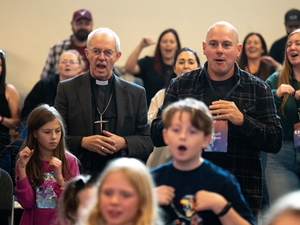
15 October 2023
Archbishop worships with three different congregations
Archbishop Justin worshipped in three very different congregations on the final day of his three-day ... read more
-
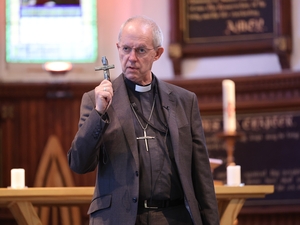
14 October 2023
Archbishop tells prisoners and community leaders about transformation
Archbishop Justin visited inmates in HMP Isle of Wight to talk to them about transformation, ... read more
-
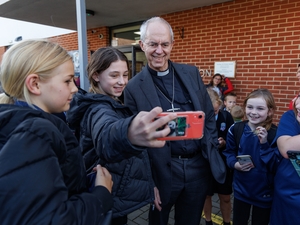
13 October 2023
Island schoolchildren and churchgoers quiz Archbishop
Isle of Wight schoolchildren and churchgoers quizzed the Archbishop of Canterbury during visits to two ... read more
Island schoolchildren and churchgoers quiz Archbishop
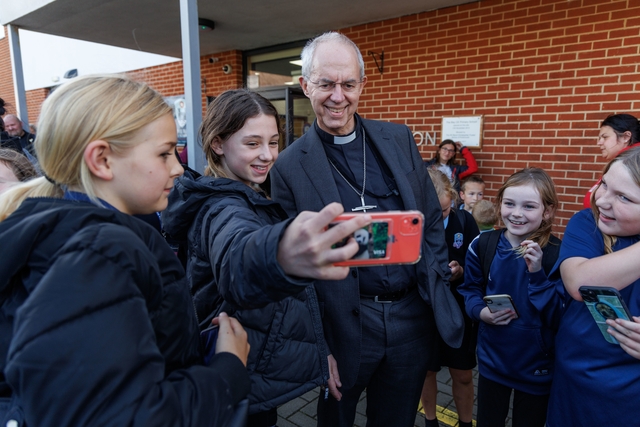
IT was a question that the Archbishop of Canterbury had never been asked before.
Fifteen-year-old Yasmin Smith, from the Bay C of E School in Sandown, wanted to know if there was anyone who Archbishop Justin Welby had not wanted to pray for. She asked her question as part of a visit by the Archbishop to the Isle of Wight school.
He said it was a brand new question for him, and admitted there are people he struggles to pray for. But often once he starts to talk to God about them, the Holy Spirit helps him to actually believe what he's praying.
Yasmin said: "I always thought that bishops and archbishops had to pray for everyone. So it was good to hear that he does find it difficult. It was a convincing answer."
The Archbishop visited the Bay C of E School and Christ the King College in Newport during the first day of his three-day visit to our diocese. He met more than 2,000 students for question-and-answer sessions at which no question was off limits. He talked about his personal faith, his experiences as Archbishop, what it felt like to crown the new King, and what he thought of the current conflict in Israel and Gaza.


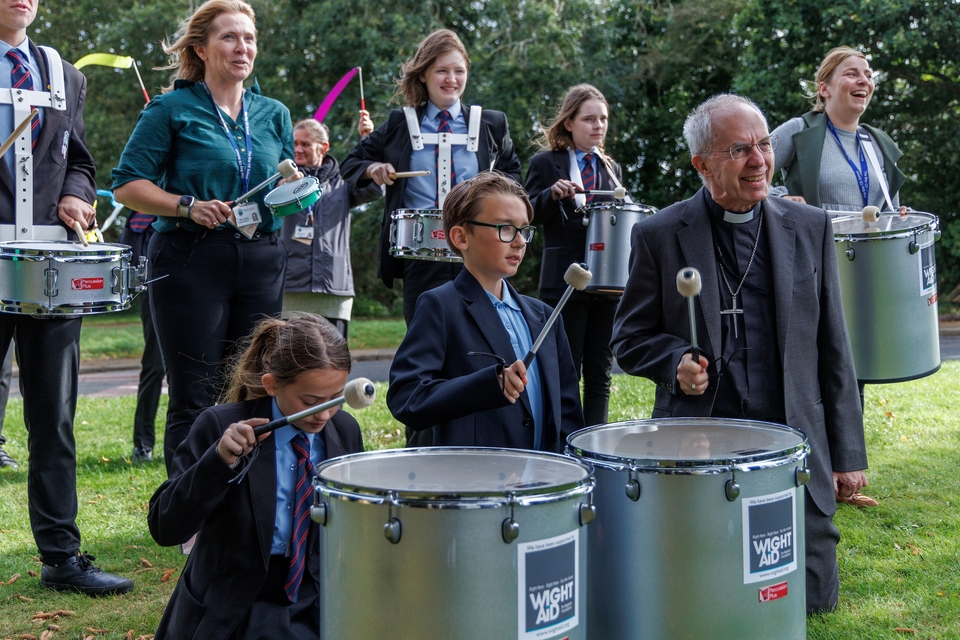
The Archbishop began his visit to our diocese at Christ the King College in Newport, a joint Church of England/Roman Catholic secondary school. He spoke to staff at the start of the day, talking about the shock they must have felt when they heard about the serious accident their colleague Gilly Harland had been involved in. He then blessed a classroom which was being used as a chapel for the first time.
The Archbishop then met students in three different sessions - Years 7 and 8 in the auditorium, Years 11, 12 and 13 in the sixth-form hall, and Years 9 and 10 back in the auditorium. Each was preceded by worship led by an accomplished student worship band. Among the questions he was asked by students were those about how he became Archbishop, how many services he attends each week, and whether he ever regretted becoming a priest.
Sixth-former Kylan Sawyer, aged 16, asked him about Islam and the current conflict in Israel and Gaza. He said: "It was really interesting to hear what he thought."
At the Bay C of E School, Archbishop Justin was welcomed by a samba band as soon as he stepped out of the car. Inside, he heard a joint choir from the primary and secondary sites singing, and then prayed for both parts of the school as he blessed two commemorative plaques. He spent time in the school's library, where Yasmin Smith and others asked him questions.
He then took part in two student conferences with pupils from the Bay C of E School and Niton Primary School, where he was asked more questions about his faith and his role. Among them were queries about the Bible verse that had helped him the most, his attitude towards fossil fuel as a former oil executive, and his role at the Queen's funeral and the King's Coronation. He described one of his proudest moments as being with refugees last week in Armenia.
Then he had a chance to meet parents picking up their children from the primary site of the Bay C of E school, and then spoke to staff after the school day was over.
Bram Lorenz, whose son Buddy, aged 7, goes to the Bay C of E School, said: "You don't expect to run into the Archbishop when you are picking up your child from school, but he was very relaxed and we appreciated it."


In the evening, Archbishop Justin took part in an evening at Holy Trinity Church, Bembridge, during which he was asked questions that had been contributed by churchgoers, villagers and children from Bembridge C of E Primary School - though the Archbishop didn't know what he would be asked in advance. A full congregation also sang hymns and worship songs that had been specially chosen by the Archbishop, with a choir and music group accompanying them.
The vicar and Archdeacon of the Isle of Wight, the Ven Steve Daughtery, posed the questions alongside newly-ordained deacon the Rev Clare King. The questions included a discussion about the Archbishop's difficult childhood, and his conversion experience in Cambridge. He also spoke about how his faith helped him when his daughter died 40 years ago in a car crash.
The questions he answered touched on the current tragic situation in Israel and Gaza, the supposed decline of the Church of England, and the current state of British society. He answered one question posed by a parishioner who had lost her husband and wanted to know about the part of the Creed that mentions the resurrection of the dead and the life eternal.
"When our daughter died 40 years ago, we were so aware of the presence of God," he said. "I held her in my arms as she died, and it felt as though Jesus was stretching out his hands and I was handing her over to him. My mother had been an alcoholic, but came to faith and stopped drinking. When she died on July 15 this year, I was with her. We were praying for her and it felt as though we were passing her into the hands of Christ too.
"Grief is utterly devastating, especially the loss of a partner or a spouse. But our hope is that this world is not all there is. Christians have believed for thousands of years that their experience of Christ in this world means that they can trust him to take them into the next world. When everything in this world fails, we need to know that this world is not everything there is."
Among those listening were Laura Campos Albuquerque and Joe Norton-Jones, who moved to the Isle of Wight in the past six months and have started coming to Holy Trinity Church.
"I appreciated his honesty, how raw he was and how personal it was," she said. "It was great that he was happy not to know the questions in advance and that he wasn't avoiding hard topics. It meant that it felt authentic and he came across as trustworthy."